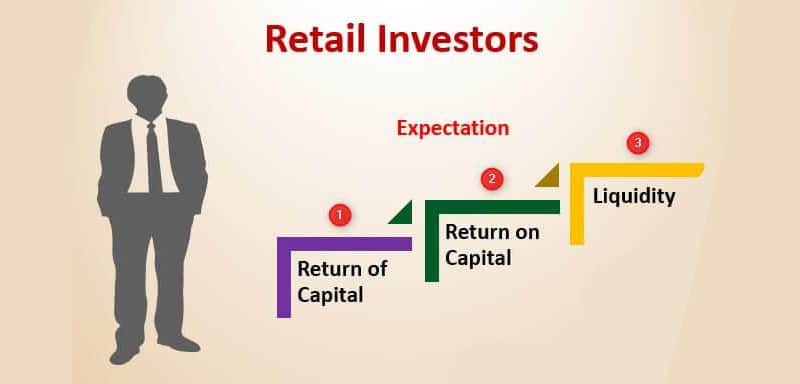
Different investor types come with their unique peculiarities, which means that there are distinct differences between retail investors and institutional investors. Knowing these differences will prove to be profitable in the long run.
Therefore, if you are looking to foray into a certain mutual fund or stock that you have seen somewhere, the chances are high that you don’t meet the criteria for an institutional investor. Hence, knowing what the key differences are between them will save time and resources.
Institutional investors

These guys are like the kings of the jungle, that is, the financial market. They handle mutual funds, pension funds, insurance companies, endowment funds, and insurance. Of the total volume of trade happening in the New York Stock Exchange, Institutional investors handle about a third of the volume. They are very influential and handle a large chunk of the shares. One good thing about being an institutional investor is that you get faced with fewer regulations from the SEC.
Also, the funds invested by institutional investors are not theirs as they help other people invest. If you are not clear about what this means, just picture a situation where your pension funds are being managed by such investors.
Due to the size of such investors and their organizations, they can negotiate for better compensation for their investments. Also, they can leverage certain investments that normal investors may not be able to.
This investment type is for those who want to cash out big from the market. Although the risks are significant, the rewards are equally tempting. Before you venture into this terrain, it is advisable that you consult experts in the field and read as many materials as you can.
Benefits of being an institutional investor
Institutional investors offer certain distinct benefits. These benefits go beyond giving you financial returns and include network, counsel, and other related help. Also, they assist retail investor’s leverage on the capital market, which in turn gives better gains. They do this with fewer risks and almost no need for financial market exposure.
Greater influence
Being an institutional investor means you will be among those who control a large chunk of America’s financial base with a huge influence on the global market. The influence exerted by such investors has seen a steady rise over the past few years. This can be attested to their influence on publicly traded companies.
Limited regulatory control
Unlike retail investors who are heavily restricted, especially regarding the type of deals they can venture into, institutional investors enjoy a lot of liberties. For instance, as an institutional investor, you are at liberty to invest in high-risk ventures because it is assumed that you are exposed to them and experienced to handle the complexities associated with them.
Greater returns on investment
Being an institutional investor exposes you to more instruments that may not be available to retail investors. As a result, your volume increases. Due to the large trade volume, coupled with the few restrictions that come with being an institutional investor, you will stand a better chance to make big bucks.
The importance of institutional investors in America cannot get overstated. The large financial groups in the capital market have, with time, created a positive effect on the prevailing economic situation. The role of institutional investors as shareholders has shown to improve the overall industry. The reason for this is that the activism brought about by such investors progressively brings about closer monitoring of the financial market.
Retail investors

Retail investors deal in debts and related investments via institutions such as banks, brokers, and real estate agents. They are often motivated by individual goals like saving for future retirement or making a large purchase over time, for example, their own home. Due to retail investors’ limited financial power, they usually pay higher costs for the trades carried out.
It suffices to say that the SEC views retail investors as investors who are not sophisticated and do not venture into certain risky investments. This category is the small-timers’ game, which means your chances of hitting it big are highly limited.
If you are learning the ropes in the world of investing, this is the ecosystem for you. Becoming proficient in this venture generally requires you to read more, learn more from tutorials, and get a mentor.
Benefits of Being a Retail Investor

Being a retail investor has its outstanding benefits, which are the following.
You don’t have to worry about liquidity
Being a retail investor means you do not have to bother yourself too much about liquidity. Unlike institutional investors who are always in search of large deals running into millions, retail investors make do with the little they can. As a retail investor who is just purchasing a few shares every time, you do not have to bother yourself with liquidity issues.
The trades cost less
When it comes to retail trading, fees are lower when compared with institutional investors. As an investor in this line, you will incur more reasonable transaction costs. Aside from the lower fees, retail investors get exposed to more information about the market, which means fewer risks and more returns.
Less risk of a heart attack
Being a retail investor means you get faced with less pressure, which means you have more time to be patient. Larger investors do not have this luxury as they get faced with pressure to make profits. Being a retail investor means you will only have yourself to answer to. Thus, you can wait for months, even years for the investment to yield benefits.
Final thoughts
The place of retail and institutional investors in the market cannot be overemphasized because each one plays a vital role in the value chain. Knowing the distinct differences between both categories of investors can save you both time and resources. Also, knowing their differences will help you know which suits you best.
If you intend to go for the long haul without being exposed to the risks associated with the capital market, retail investing will be ideal for you. But, for those who want to cash out big and aren’t scared of the associated risks, institutional investment is the real deal. Whatever the choice you settle for, know that each one has its unique rewards.







